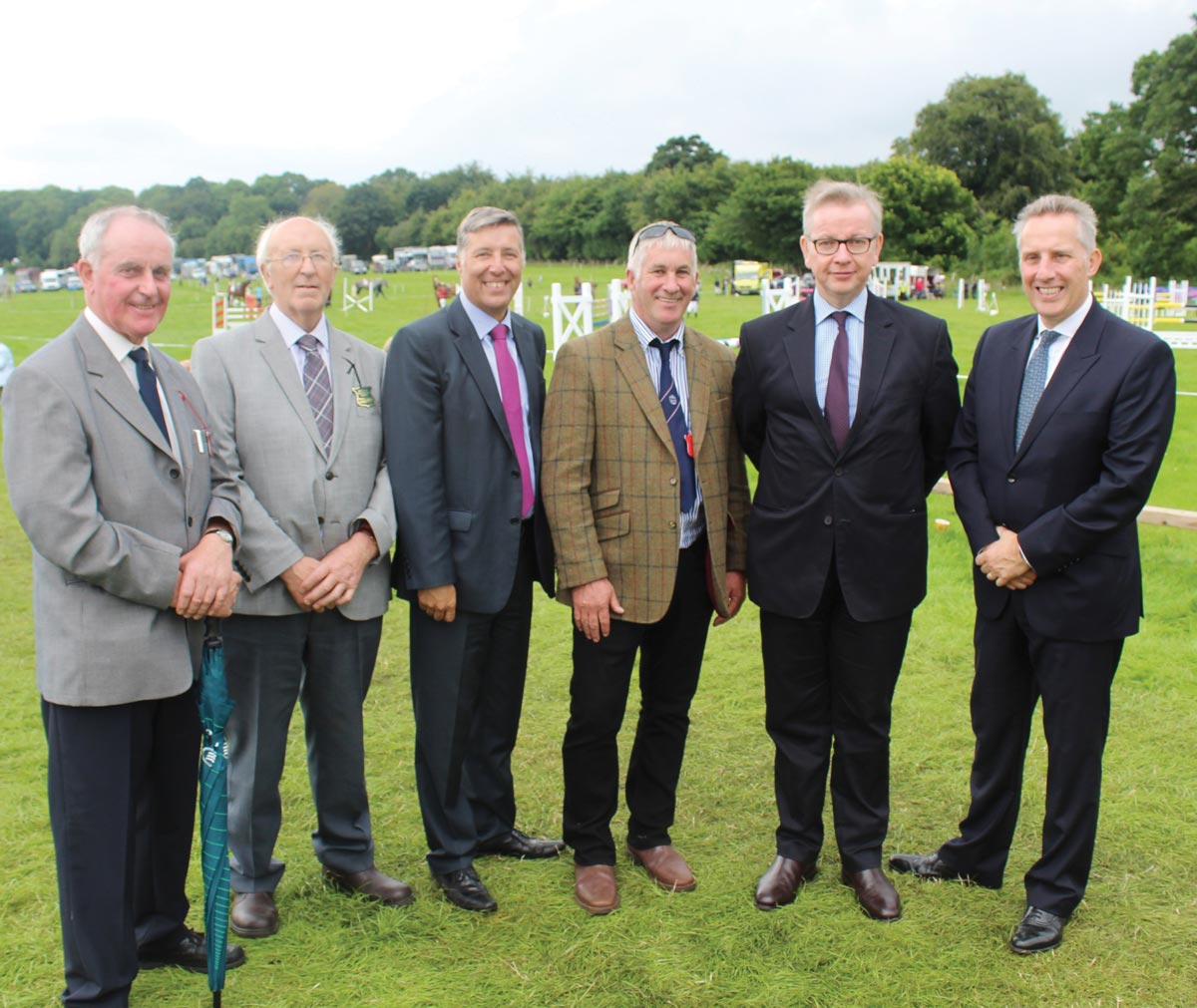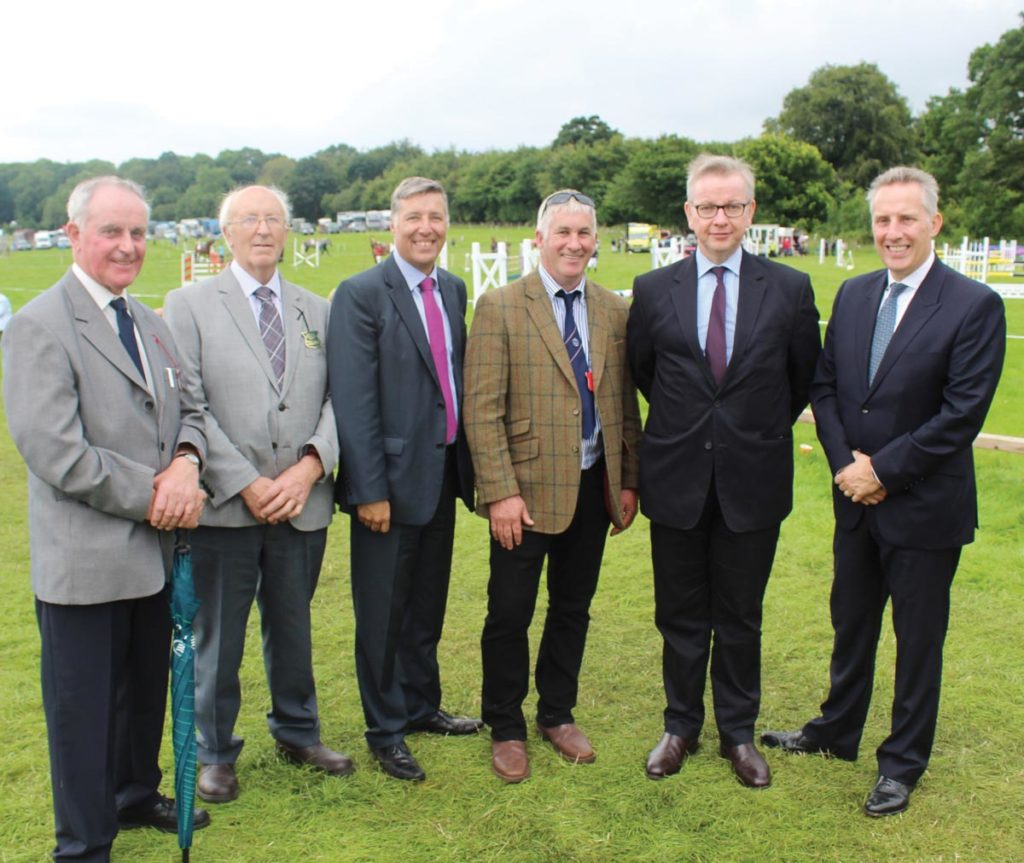Gove confirms the importance of cross-border agri-food trade links

DEFRA Secretary of State Michael Gove MP claims that cross-border trade in agri-food products will not be affected by Brexit.
Current cross-border trade patterns in agri-food products will not be affected by whatever final Brexit agreement is struck between London and Brussels, according to UK Agriculture Minister Michael Gove.
“A pragmatic approach will be required to reach a final settlement,” he says. “However, the British Government fully recognises the importance of the long established trading arrangements that are a feature of the farming and food sectors on the island of Ireland. These must be retained.”
Gove made his comments while visiting this year’s Antrim Show. Commenting on his policy priorities for agriculture, he says that the industry must be allowed to “grow more, produce more and market its output more effectively”.
Gove adds: “Farmers must be supported to help maintain and improve the environment. I also want to see better use made of new technologies that will increase agricultural output and enhance biosecurity. There is also a requirement to improve plant and animal health standards.”
The DEFRA Secretary of State is firmly of the view that the UK Government now has an historic opportunity to review its policies on agriculture, on land use, on biodiversity, on woodlands, marine conservation, fisheries, pesticide licensing, chemical regulation, animal welfare, habitat management, waste, water purity, air quality and so much more.
He says: “Leaving the European Union will mean leaving the Common Agricultural Policy and taking back control of environmental policy. In this unfrozen moment new possibilities occur.
“Now, I can understand why, for some, this is a moment of profound concern. The European Union has, in a number of ways, been a force for good environmentally. Our beaches are cleaner, habitats are better protected and pesticides more effectively regulated as a consequence of agreements that we reached since we entered the EU. I have no intention of weakening the environmental protections that we have put in place while in the European Union.”
But Gove believes the EU has not always been a force for good environmentally, adding: “As the UK Climate Change Act shows, this country is more than capable of bringing in our own strong legislation to protect the environment, independent of the EU.
“It’s important that as we look at the history of EU policy, we recognise that environmental policy must also be insulated from capture by producer interests who put their selfish agenda ahead of the common good. And here the EU has been weak recently.
“The EU’s handling of diesel emissions, the way in which car manufacturers rigged testing procedures, and the consequent risk to public health which we have to deal with, do not reflect well on the European Union’s internal processes.”
Gove also believes that the Common Agricultural Policy has not been reformed in ways that espouse the highest possible environmental standards and adds that it, along with the Common Fisheries Policy, are the two areas where the EU has most clearly failed to achieve its stated environmental goals.
“The Common Agricultural Policy rewards size of land-holding ahead of good environmental practice, and all too often puts resources in the hands of the already wealthy, rather than into the common good of our shared natural environment,” he stresses.
“It also encourages patterns of land use which are wasteful of natural resources and often intrinsically poor value rather than encouraging imaginative and environmentally enriching alternatives.
“As the most recent report from Lord Deben’s excellent Committee on Climate Change and its equally excellent Adaptation Sub-Committee points out, current EU-inspired farming approaches are degrading our soil. In some areas a combination of heavy machinery, irrigation methods accelerating erosion and a determination to drive up yields has meant that soil has become less productive.
“It is not only less effective at sequestrating carbon, it is progressively less fertile. The effect is most noticeable in what has been some of our most fertile growing soil, in the Fens, where a combination of the draining of the peat and the disappearance of hedges and trees over the years has led to a thinning of productive earth. According to the Committee’s report, Britain has lost 84 per cent of fertile topsoil since 1850 and the erosion continues in some areas at between 1cm and 3cm a year.”
Where the future of farming support is concerned the current UK government has pledged that when Brexit takes effect, London will match the £3 billion that farmers currently receive in support from the CAP until 2022.
Gove adds: “I want to ensure that we will go on generously supporting farmers for many more years to come. But that support can only be argued for, against other competing public goods, if the environmental benefits of that spending are clear.”
“We are uniquely fortunate that British food enjoys a reputation for quality which has been built on high animal welfare standards, strong environmental protections and the dedication of farmers and growers to meeting ever more demanding consumer expectations.”
“Of course there are many other, very good, reasons why we should provide support for agriculture.
“The first is simple and straightforward. Farmers produce the high quality food which the rest of us enjoy so much. Without them, our lives would be poorer, and our stomachs emptier.
“We are uniquely fortunate that British food enjoys a reputation for quality which has been built on high animal welfare standards, strong environmental protections and the dedication of farmers and growers to meeting ever more demanding consumer expectations.
“Our food culture in Britain has become much more diverse and discriminating in my lifetime, influenced by chefs and bloggers, campaigners and entrepreneurs. I was delighted when I was Education Secretary to have been able to harness their enthusiasm to develop a School Food Plan designed to give the next generation a deeper appreciation of the importance of what we eat. Of course, the biggest driver of higher standards and wider choice in food and drink has been the innovation and creativity of farmers and growers themselves. It is my job to support them to grow, produce and sell more.”
The Farm Minister went on to confirm that agriculture is much more than a business with the public good associated with the maintenance of the highest possible environmental and conservation standards a key driver for the future.
“The beautiful landscape that we enjoy in so many cases has not happened by accident but has been actively managed,” he comments. “Support for farmers in hill areas, or those running small family farms in Northern Ireland, is needed to ensure that the human ecology of rural areas is protected.
“But while continued support is critically important, so is reform. Indeed, I have been struck that it is farmers themselves who most want the CAP to change.
“They have seen how it holds back productivity, impedes progressive environmental stewardship and works against their natural instincts. Farmers owe their living and devote their lives to the land. They are engaged, every day, in practical environmental work and they deserve our respect and support for their commitment to the countryside.”
Specifically, Gove wants more support for woodland creation and tree planting. In his opinion, not only are they a source of beauty, they are also a carbon sink, a way to manage flood risk and a habitat for precious species.






